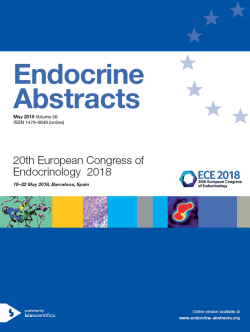
20th European Congress of Endocrinology
Barcelona,
Spain
19 May 2018 - 22 May 2018
Guided Posters
Pituitary / Growth Hormone ' IGF Axis
ea0056gp184 | Pituitary / Growth Hormone ' IGF Axis | ECE2018
Adrenal insufficiency induced by anti-PD-1/anti-PD-L1 therapy in patients with cancer: a series of cases
Peiro I , Iglesias P , Simo-Servat A , Taberna M , Ruffineli JC , Guerrero F , Diez JJ , Villabona C
ea0056gp185 | Pituitary / Growth Hormone ' IGF Axis | ECE2018
Long-term treatment with metyrapone in four patients with Cushing’s disease
Driessens Natacha , Maiter Dominique , Borensztein Pascale , Jaspart Amelie , Bostnavaron Martine , Beckers Albert
ea0056gp186 | Pituitary / Growth Hormone ' IGF Axis | ECE2018
Primary posterior pituitary tumors: a unique neoplasm with hight morbidity
Guerrero Fernando , Vidal Noemi , Del Pozo Carlos , Blanco Concepcion , Rivero-Celada David , Diez Juan Jose , Iglesias Pedro , Pico Antonio , Villabona Carles
ea0056gp187 | Pituitary / Growth Hormone ' IGF Axis | ECE2018
Erdheim-chester disease presenting with hypopituitarism and diabetes insipidus
Sugano Hisashi , Kitamura Wataru , Urata Tomoyuki , Okamoto Taku , Numoto Kunihiko , Maruyoshi Natsue
ea0056gp188 | Pituitary / Growth Hormone ' IGF Axis | ECE2018
Growth disorders in paediatric survivors of hematopoietic stem cell transplantation after chemotherapy-only conditioning- the experience of a single center
Cima Luminita-Nicoleta , Lambrescu Ioana Maria , Nedelea Lavinia , Sava Elisabeta , Leca Bianca , Vadana Elena-Alexandra , Colita Anca , Barbu Carmen Gabriela , Fica Simona
ea0056gp189 | Pituitary / Growth Hormone ' IGF Axis | ECE2018
Association of IGF1 receptor autoantibodies with height and body size
Haudum Christoph , Minich Waldemar , Munzker Julia , Groselj-Strele Andrea , Kolesnik Ewald , Mursic Ines , Schwiebert Christian , Welsink Tim , Schmidt Albrecht , Pieber Thomas , Schomburg Lutz , Obermayer-Pietsch Barbara
ea0056gp190 | Pituitary / Growth Hormone ' IGF Axis | ECE2018
Insulin sensitivity improves after disease control in acromegaly irrespective of treatment modality and despite an increase in intrahepatic lipid content: data from an investigator-initiated prospective trial
Arlien-Soborg Mai C , Dal Jakob , Madsen Michael , Hogild Morten , Jessen Niels , Jorgensen Jens Otto Lunde
ea0056gp191 | Pituitary / Growth Hormone ' IGF Axis | ECE2018
Ectopic Cushing’s syndrome secondary to medullary thyroid carcinoma with apparent signs of hypercortisolism: a case report
Canat M Masum , Cakir Sezin Dogan , Yildiz Duygu , Ozturk Feyza Yener , Erol Rumeysa Selvinaz , Sen Esra Cil , Saygili Emre Sedar , Basmaz Seda Erem , Batman Adnan , Altuntas Yuksel
ea0056gp192 | Pituitary / Growth Hormone ' IGF Axis | ECE2018
A case series of endocrine immune-related adverse effects of checkpoint inhibitors
Adamidou Fotini , Georgiou Thomas , Kafantari Katerina , Komzia Paraskevi , Vagionas Anastasios , Kita Marina
ea0056gp193 | Pituitary / Growth Hormone ' IGF Axis | ECE2018
Hypophysitis due to immune checkpoint blockade: rising numbers.
van den Berg Gerrit , van den Brom Rob , van der Klauw Melanie , Hiltermann Jeroen , Hospers Geke , Links Thera



